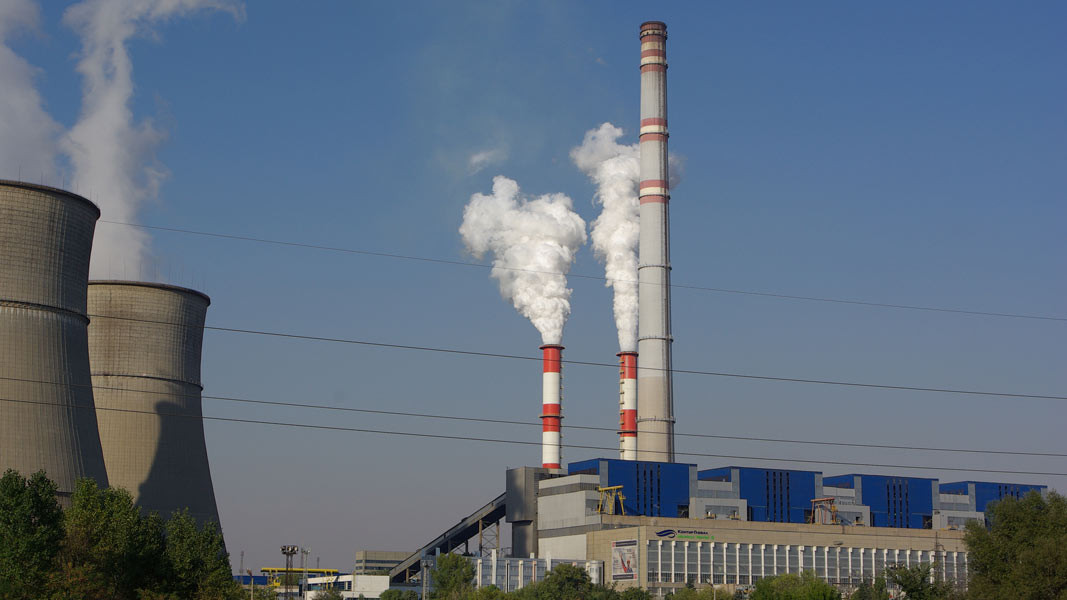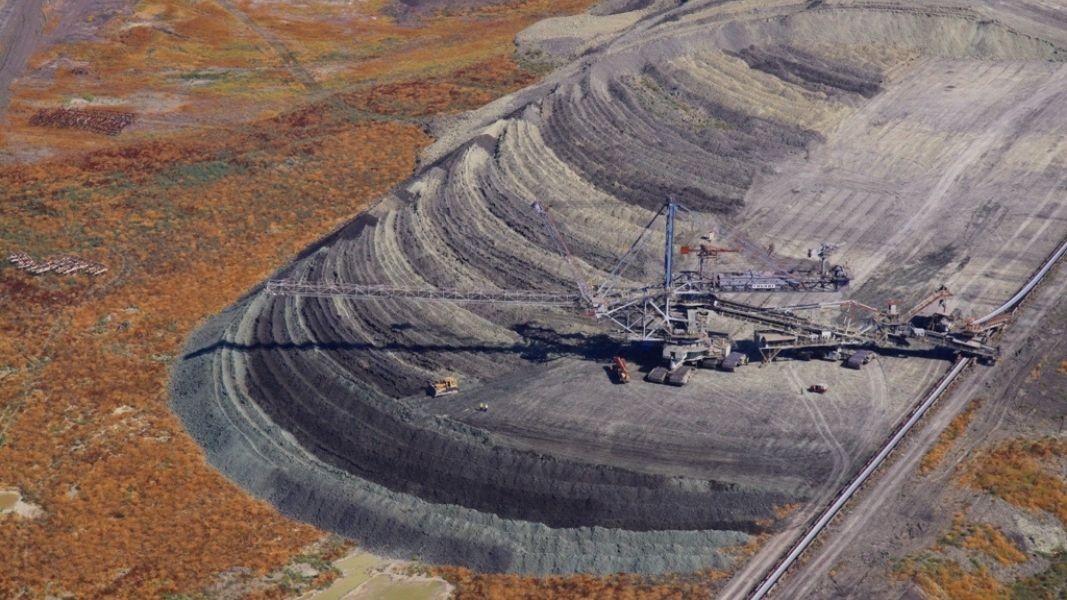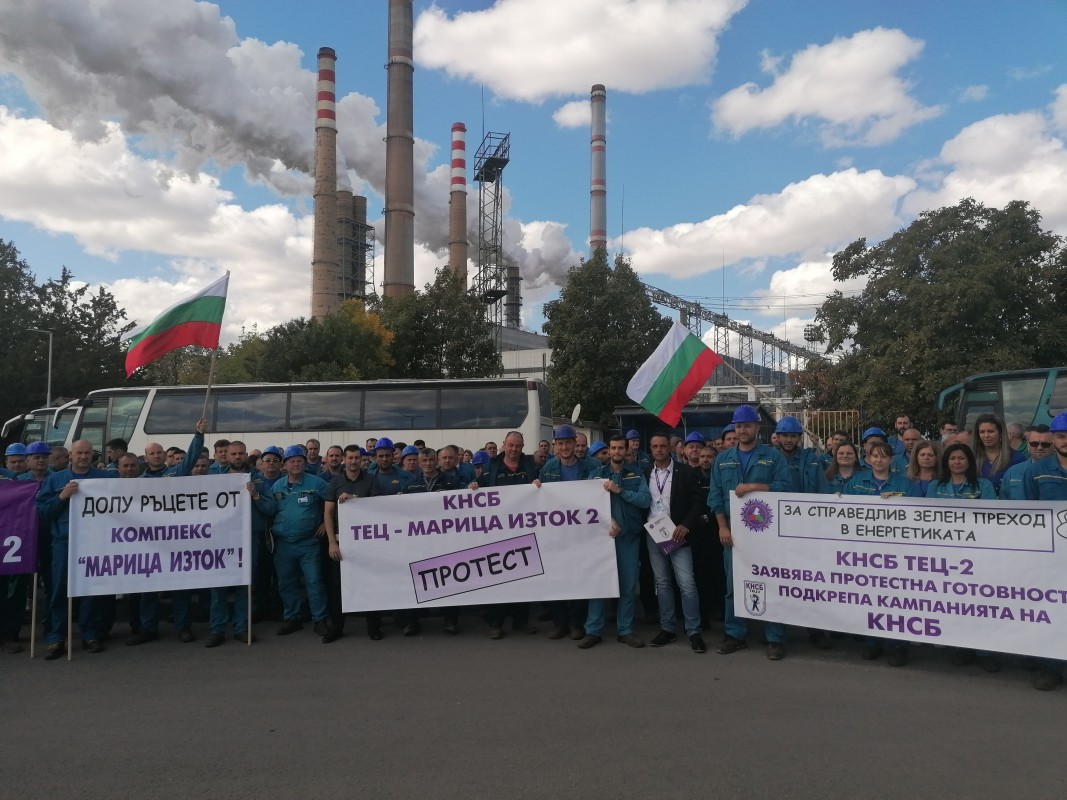The last Bulgarian Parliament obliged the Council of Ministers to amend the National Recovery and Resilience Plan in the field of energy. The main change is to keep the coal-fired power plants operating until at least 2038.
With the adopted decision, the Parliament requires that, by 31 March 2023, the Bulgarian Council of Ministers should submit a reasoned request to the European Commission to amend Bulgaria's National Recovery and Resilience Plan. This must be done in line with the REPowerEU plan to reduce the energy dependence of EU countries on Russia.
The adopted changes include dropping the commitments already made to reduce carbon emissions from electricity generation by 40% by the end of 2025.
The Bulgarian caretaker government must also come up with a way to ensure the decarbonization commitment is met without shutting down the Maritsa Basin coal-fired power plants indefinitely until at least 2038.
What follows from the decision of the last Bulgarian Parliament?
I speak to energy expert Apostol Dyankov*, head of the Climate and Energy Programme at WWF-Bulgaria. The World Wildlife Fund (WWF) is one of the participants in the Climate Coalition and the Green Restart Coalition. On the one hand, the Parliament decided that Bulgaria should renegotiate the Energy Chapter of the Recovery and Resilience Plan, and on the other hand, the European Commission replied that renegotiation of the Recovery and Resilience Plan could only take place in exceptional cases and for objective reasons. What can we expect from the Bulgarian energy sector from now on?

"First of all, I will say that the European Commission has also clarified that this decarbonization reform was in fact key to the approval of the plan. That is to say, it is difficult for us to do without it and so actually be granted this funding. On the other hand, decarbonization is also a statutory requirement in order to be able to approve the territorial fair transition plans, which are also overdue. In order for there to be such regional plans, there must, of course, be an energy transition.
I think what we have seen in Bulgarian Parliament in the last days of its existence was a bit of a mass intoxication and a bit of a delusion or just a delusion on the part of the MEPs, because indeed this negotiation process would be extremely difficult, if it happens at all, it is possible that there would not be such at all and we would just lose the money under the plan. And on the other hand, what is proposed in this draft decision would not be accepted in any way, in my opinion, neither by the European Commission nor by the other EU Member States, because under Article 21 of the Rules of Procedure Regulation, under which a failure to reform could be negotiated, a decision would also have to be taken by the European Council - that is, the member states, through their ministers, would have to confirm that decision", says Apostol Dyankov.
On the one hand, Delyan Dobrev, Chairman of the Committee on Energy, has pointed out that Bulgaria is first in Europe in reducing carbon emissions and that we have already achieved the 2030 target. On the other hand, the European Commission has argued that Bulgaria is the EU country whose economy relies most on carbon and that Bulgaria's clear commitments to the decarbonization recommendations were a key element in the approval of the Recovery and Resilience Plan for Bulgaria. Is it true what the Chairman of the Committee on Energy has said, that Bulgaria is first in Europe in reducing carbon emissions?
"It is by no means true; it is a very misleading statement because the date quoted, 1990 or 1988 as it was in the Kyoto Protocol, does not correspond in any way to the current realities. As we know, between 1988 and 1990 Bulgaria was a country of 8 million people, a country dependent on an extremely dirty industrial economy that we simply no longer have.
That is to say, actually looking at how emissions stand at the moment in Bulgaria as an EU Member State compared to other European countries, we are very close to the average per citizen of the European population for carbon emissions. Notwithstanding the fact that our economy is not that productive, and it is not that productive because there is a lack of innovation, there is a lack of overall planning of the economy so that it can develop towards innovative sectors - not for the fact that it is not generating even more emissions. And the dates that are being discussed in the EU at the moment relate to 2005.
And here it is important to note that until now, Bulgaria has simply not had a decarbonization target", explains Apostol Dyankov.

Why are we talking about 2005?
2005 is a base year. What will now be adopted as The Fit for 55 package will be looking at a more recent period, more recent years and Bulgaria will also get its decarbonization targets. And the most sensible thing we can do is to develop a long-term decarbonization strategy that is backed by a decarbonization fund.
Also, Bulgaria does not have a long-term decarbonization strategy.
"What is being thought of in Bulgaria is some kind of energy strategy, a national strategy. Attempts have been made for several years to have such a strategy to anchor these high-emission industries. This strategy does not comply with European legislation at all, because there is a search for a long-term integrated strategy, i.e. to have an integrated climate and energy plan by 2030, because the two policy sectors are linked, and Bulgaria does not have a long-term decarbonization strategy by 2050. We do not currently have these documents in place.
Our plan is outdated and has to be revised in 2023, while the Ministry of Energy has promised that it will propose it for discussion, although no such discussion has taken place so far.
And, in fact, if we want to comply with European requirements, deadlines, and regulations, we really need to move towards policies that set out real decarbonization, not looking for an excuse, a postponement of the deadline for plant closures, whether closures will be on a market basis, and so on. No, there must be compensation for this sector and, at the same time, we must try to agree on real plans, deadlines, and measures that will lead to decarbonization".
What does the National Recovery and Resilience Plan envisage for Bulgaria by the date 2025?
"Indeed, 2025 is mentioned because this is actually the horizon of the action of the recovery and resilience plan and by then we have to achieve a 40% reduction in greenhouse gas emissions that result from the production of electricity from these plants".
But the plan itself does not mention how this is to be done. It does not mention whether thermal power plants and coal-fired power stations should be closed. Right?
"It does not mention it, and this is done to give Bulgaria flexibility and the opportunity as an EU member state to determine how these emissions should be reduced - whether to close individual capacities, and another option is to switch many of the plants to seasonal mode. I would like to stress that we should not fool ourselves, it is very difficult to achieve these targets without closing some of the plants. I would like to stress that it does not seem likely that, whatever negotiating regime we enter into with the European Commission, with the other Member States, we can come out of that negotiating regime without there being a specific commitment to close at least some of the Thermal Power Plants. And perhaps to offset those emissions, because what Bulgaria would like at the moment is for the first two years of the plan, where 10% is the indicative reduction, to drop that as a requirement. It should therefore drop some of the emissions that would occur later.
That is, perhaps the later date for the closure of all coal plants, which is 2038, should be brought forward. That is naturally absent from the MPs' decision, but let us be realistic, in the complex and difficult negotiations with the European Commission that the Bulgarian Parliament has charged the caretaker Government with conducting, it is not realistic to come up without an updated coal reform that will include the closure of capacity and the change of the end date or any of those elements".
How does the war Russia is currently waging against Ukraine affect Bulgaria's coal capacity?
"The war in Ukraine has an impact. The production of electricity from coal last year grew by 22%, although the domestic energy consumption in Bulgaria is decreasing, that is, it is less than the previous year, partly because renewable energy sources are being installed. That is to say, we do not just have a crisis. The economy is recovering, but companies are installing renewable energy and solar installations, for example, for their own use. So domestic consumption is falling, but we are exporting more electricity. We are exporting more electricity regionally to neighbouring countries, which are in turn compensating for the electricity, because there is a shortage in our entire grid, there is a shortage in Moldova, for example, as far as I know, after Ukraine was connected to the European grid, electricity can no longer be supplied from there because of the air strikes and attacks by Russia.
So there is a shortage, and it is being compensated for by coal-fired power stations. Coal is even being exported, which was not the case before, Bulgaria is exporting certain quantities of coal to Serbia, so there is a big upswing. There is also a huge upswing in the profits of these plants, they were operating at a loss for a very long time and it was even thought that they would not operate for many more years.
But now, within this year, they have made a very serious profit, and this is unfortunately often put forward as some kind of argument. I don't think profit in itself is an argument for something to work unless some of that money is actually invested in a real green transition and development".

However, apart from Bulgaria, there are attempts elsewhere in Europe to keep coal-fired power going for as long as possible. We have seen the protests in Germany, where an entire town was literally wiped out because of a coal mine, and 2025 is not just a deadline for Bulgaria, it is for the whole of the European Union. After all, we have three years. How do you imagine that things will develop from now on? Not only for Bulgaria.
"We will not close the coal industry by 2025. It is not realistic for that to happen not only in Bulgaria, but in other countries in the European Union as well, but our Bulgarian date is too late. And there is an opportunity here to look at the German case you mentioned.
In Germany, the huge industry that was previously supported by coal-fired power plants is about to close early.
There, the date has been renegotiated from 2038 (the same as Bulgaria's) to 2030, meaning that these plants will close sooner, but they will be allowed to operate in an increased mode now that they have to compensate for the gas that is not coming into the German economy.
We can see what huge intolerance there is already in many parts of Europe about the continuation of this high-emission energy industry.
I would not want to see such conflicts in Bulgaria. It would be better to plan realistically, to be able to bring these capacities into some realistic regime, i.e. not 2038 for sure, so that we do not end up with such social conflicts. Unfortunately, these extreme weather events, the climate disasters associated with global warming, are only going to become more frequent. That is to say, the sooner we leave the high-emission energy industry behind, the more chance we have of reducing the damage from the climate crisis".

In Germany, civil society is protesting against coal mines, and in Bulgaria, people are protesting in their favour, and it is partly because of this pressure from coal mine workers, who have been protesting for days outside Parliament, that this decision was taken by the Bulgarian Parliament.
"Yes, I would not say that Bulgarian society is protesting in defense of coal, but the people directly affected are protesting. And I kind of support part of their motivation to protest because they have been lied to for many years and they don't have the full information that this transition is actually going to happen. Maybe they are protesting because they have no other options. I don't think there is any consensus on coal in Bulgarian society.
What we need is a strong, clear, and meaningful information campaign by the institutions, by the Ministry of Energy, by other institutions. People need to understand why this transition is needed and how we could do it, then bring together to the table different organizations, different stakeholders, and civil society representatives to talk about the real transition. And that transition should take place in such a way that we are neither left without electricity, nor that Bulgarian energy sovereignty and security are violated, nor that we wonder in 10 years' time why we are back on Europe's tail because we have not made our transition. And then it will be too late".
After the EU sanctions against Russia, there is a lot of talk in Europe in favour of coal production, in favour of using new nuclear power capacities. However, according to energy experts, nuclear power and coal are a mix of the past and the future does not belong to either of these technologies.
Are we, Europeans, hostage to both coal, on the one hand, and nuclear power, on the other? And are renewables coming to Bulgaria fast enough for us to abandon both old technologies in the near future?
This is a complex question. Nuclear energy is very low-emission. It does not generate greenhouse emissions in the production of electricity itself. This is important to say, i.e. if there were reliable, cheap, and safe nuclear technology, it would not be bad for the climate. We are not enemies of technology in general. We know that the USA has recently had a breakthrough with nuclear fusion, which is a fission-free nuclear technology, and it is good that this type of safe and secure technology is being developed in the future. The main problem with nuclear power and the current generation of nuclear power plants is that they are expensive. They are simply too expensive relative to renewables, and the only reason that countries are planning them is that there is a worry that we will always need baseload capacity that produces electricity all the time.
Yes, that's the way our centralized power system is currently set up, we need them, but in the more distant future we will be on decentralized systems where maybe each community can produce almost all of its own power and it won't be necessary. But even now, when we can say we need baseload capacity, nuclear power is the slowest to build, taking more than decades. It is the most expensive and, assuming it is still operated responsibly and safely and does not generate emissions, its benefits would come in ten to 10 to 15 years, and at a very high cost.
Let me also mention something about RES. Renewable energy is available, and we should not only mean photovoltaic parks, but also wind farms.
For example, in the offshore area of the Black Sea, there is excellent potential for us to develop wind farms. I believe that all the environmental risks to biodiversity could be managed very successfully.
Renewable facilities would actually replace what we now get from the combination of coal and nuclear power stations.
Another thing we can do naturally is to build smart grids that maximize the potential to save energy and use it when we need it. We need more investment in the energy communities that are finally unlocking in terms of legislation and regulation.
Very soon, the first measure will be legislated in Bulgaria, whereby ordinary Bulgarian citizens will be able to receive subsidies so that they can install photovoltaics on their roofs. This measure is also under the Recovery and Resilience plan.
I think that when people feel that they can be their own energy producers and, control their own energy future, then they will see the benefits of new technologies coming in, because we need heat as well as electricity, and there are new technologies coming in that are rapidly becoming cheaper, such as heat pumps for single-family buildings, which are much more efficient and much more sensible than fossil fuel heating, for example. So we will have these technologies very soon. I hope that there will be the appropriate financial support, but this is another reason not to block these instruments in some way, but to reach some kind of solution so that we can move forward".
Bulgarian exports are expected to grow by 5.8% annually after Bulgaria joins the eurozone. Trade in goods could increase by 3.3%, and in the services sector, growth might reach 8.4%. This is predicted by an analysis by the trade credit insurance..
In 11 district cities in Bulgaria, 1 square meter of residential space costs under EUR 1,000. In 13 district cities, the price ranges from EUR 1,000 to EUR 1,400. In Sofia and Varna, 1 square meter of residential space costs EUR 2,400, National Real..
On the last day of last year, the Egyptian Minister of Investment and Foreign Trade Hassan al-Khatib awarded a total of nine gold licenses at a ceremony at the General Agency for Investment and Free Zones, which was also attended by the Bulgarian..
Bulgarian exports are expected to grow by 5.8% annually after Bulgaria joins the eurozone. Trade in goods could increase by 3.3%, and in the services..

+359 2 9336 661
